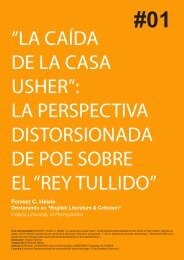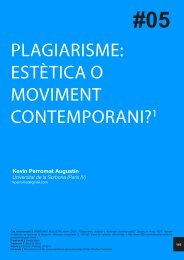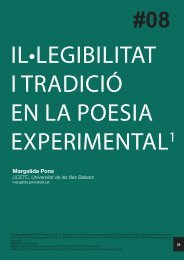03 - 452ºF
03 - 452ºF
03 - 452ºF
You also want an ePaper? Increase the reach of your titles
YUMPU automatically turns print PDFs into web optimized ePapers that Google loves.
0. Introduction<br />
A young girl, of approximately the age of eight, enters her living room<br />
completely decked out in her well-constructed Halloween costume.<br />
Wearing her black pointy hat, buckle shoes, black dress, striped<br />
socks, and a cape, while carrying the prerequisite wand, both the<br />
audience and her friend immediately recognize her as being dressed<br />
as a witch. Her friend has always had a crush on her, and he attempts<br />
to impress her by complimenting her outfit: «I like your witch costume,<br />
Lisa». A look of indignation immediately transforms her face, as she<br />
retorts, «I’m not a witch; I’m a Wiccan. Why is it that when a woman<br />
is confident and powerful, they call her a witch?» («Treehouse of<br />
Horror XIX», 2008)<br />
By now, most readers would recognize the little girl questioning the<br />
construction of the witch as none other than Lisa Simpson, from the<br />
long-running animated sitcom The Simpsons 1 . This particular scene<br />
stems from the series’ annual Halloween episodes, a collection<br />
of three vignettes entitled «Treehouse of Horror», and while the<br />
recurring characters of The Simpsons are allowed to engage in both<br />
fantastic and phantasmal scenarios in these episodes, they ultimately<br />
do not stray from their traditional roles. Hence, while Lisa takes on<br />
the characteristics of Lucy from Peanuts in this wonderful parody<br />
entitled «It’s the Grand Pumpkin Milhouse» (2008), her question is<br />
very much in keeping with the values normally attributed to her in the<br />
series—that of the outspoken feminist with a thirst for knowledge.<br />
As both the longest-running sitcom and animated series on American<br />
television, The Simpsons serves as the primary representation of<br />
modern American culture, especially as it has functioned as a satirical<br />
look at the American middle-class family. As an animated series,<br />
the series has always been allowed to take liberties and play with<br />
the conventions of a sitcom in order to make its pointed comments<br />
concerning modern culture. Yet, it is in the series’ incorporation<br />
of the fantastic, and the witch in particular, that has allowed it to<br />
make its more significant statements regarding sexual politics and<br />
gender expectations. The female characters accused of witchcraft<br />
or presented as witches not only comment on how the witch is<br />
constructed in modern popular culture, but also how issues of gender<br />
roles and expectations complicate that construction. For example,<br />
casting «The Crazy Cat Lady» as a witch allows the audience to<br />
transpose the characteristics normally associated with this character<br />
to the idea of «witch». This proves true with the many presentations<br />
of the witch throughout the series, whether it is with Marge Simpson,<br />
Patty and Selma Bouvier (Marge’s sisters), Lisa, or even baby Maggie.<br />
The Simpsons reflects (and reinforces) the construction of the witch,<br />
drawing on the characteristics first associated with it during the<br />
NOTES<br />
1 | I say «most readers»<br />
due the series’ longevity and<br />
popularity. As Matthew Henry<br />
notes, The Simpsons now<br />
holds the record as both the<br />
longest-running animated<br />
primetime program and sitcom<br />
in American television history<br />
(2007: 273). Additionally, the<br />
McCormick Tribune Foundation<br />
reported in 2006 that almost<br />
a quarter of Americans can<br />
name all five members of<br />
the Simpson’s household.<br />
While the report finds this<br />
fact disturbing, especially in<br />
relation to the questions in<br />
which the respondents did<br />
not fare as well, the report’s<br />
findings indicate not only<br />
the series’ popularity, but<br />
also its importance as a<br />
cultural artifact. McCormick<br />
Tribute Freedom Museum.<br />
«Characters from The<br />
Simpsons More Well Known<br />
to Americans than Their First<br />
Amendment Freedoms, Survey<br />
Finds», McCormick Freedom<br />
Project, [3 Dec. 2009], <br />
The Simpsons, Gender Roles, and Witchcraft: The Witch in Modern Popular Culture - Sarah Antinora<br />
<strong>452ºF</strong>. #<strong>03</strong> (2010) 115-131.<br />
117










